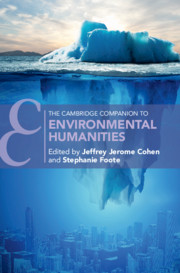Book contents
- The Cambridge Companion to Environmental Humanities
- The Cambridge Companion to Environmental Humanities
- Copyright page
- Contents
- Notes on Contributors
- Acknowledgments
- Chronology
- Chapter 1 Introduction: Climate Change/Changing Climates
- Chapter 2 The Commons
- Chapter 3 Rights
- Chapter 4 Time as Kinship
- Chapter 5 The Nature of Gender
- Chapter 6 Race, Health, and Environment
- Chapter 7 Narrative and Environmental Innovation
- Chapter 8 Climate Fictions: Future-Making Technologies
- Chapter 9 Apocalypse/Extinction
- Chapter 10 Multispecies
- Chapter 11 Food
- Chapter 12 Plants
- Chapter 13 Extraction
- Chapter 14 Ice/Water/Vapor
- Chapter 15 Rocks
- Chapter 16 Coal/Oil
- Chapter 17 Waste
- Chapter 18 Ecomedia
- Chapter 19 New Materialism and the Nonhuman Story
- Chapter 20 Risk
- Chapter 21 Coda: Virus
- Bibliography
- Index
- Cambridge Companions To Literature
- References
Chapter 17 - Waste
Published online by Cambridge University Press: 12 August 2021
- The Cambridge Companion to Environmental Humanities
- The Cambridge Companion to Environmental Humanities
- Copyright page
- Contents
- Notes on Contributors
- Acknowledgments
- Chronology
- Chapter 1 Introduction: Climate Change/Changing Climates
- Chapter 2 The Commons
- Chapter 3 Rights
- Chapter 4 Time as Kinship
- Chapter 5 The Nature of Gender
- Chapter 6 Race, Health, and Environment
- Chapter 7 Narrative and Environmental Innovation
- Chapter 8 Climate Fictions: Future-Making Technologies
- Chapter 9 Apocalypse/Extinction
- Chapter 10 Multispecies
- Chapter 11 Food
- Chapter 12 Plants
- Chapter 13 Extraction
- Chapter 14 Ice/Water/Vapor
- Chapter 15 Rocks
- Chapter 16 Coal/Oil
- Chapter 17 Waste
- Chapter 18 Ecomedia
- Chapter 19 New Materialism and the Nonhuman Story
- Chapter 20 Risk
- Chapter 21 Coda: Virus
- Bibliography
- Index
- Cambridge Companions To Literature
- References
Summary
The history of waste records a relationship that has altered over time, resulting in various literal and symbolic manifestations. Waste Studies crosses conventional disciplines to offer ethical frameworks which pay attention to, understand, and act on bodily, cultural, and societal waste. With examples from novelists Toni Morrison and Wolfgang Hilbig, this chapter illustrates a number of aspects of waste in literature: waste as material agent; waste as metaphor; and narratives structured as waste, with little hope for clarity. The strategy of slow practice through narrative construction can prove a means to inculcate an ecological sensitivity and awareness we carry with us beyond the act of reading. While waste categories often are used to dismiss, deny, and reject certain humans, other-than-human agents, and material items, waste has also been used as a means to provoke compassion and ethical engagement by which we can develop a compassionate commonality with wasted beings to act for them, for us, and for the world. Waste Studies argues that the humanities can vibrantly and dynamically work to improve all of our lives in a concrete and material way.
Keywords
- Type
- Chapter
- Information
- The Cambridge Companion to Environmental Humanities , pp. 229 - 242Publisher: Cambridge University PressPrint publication year: 2021

